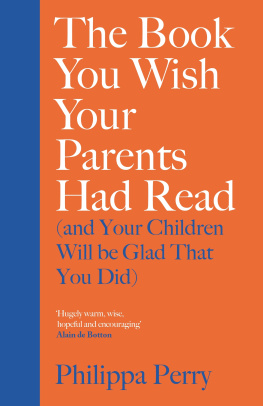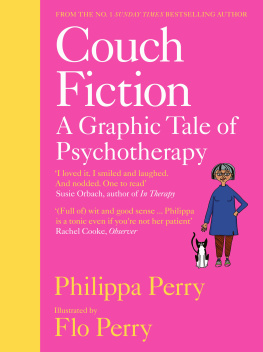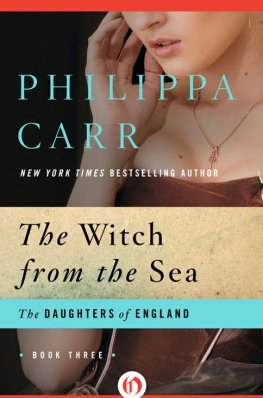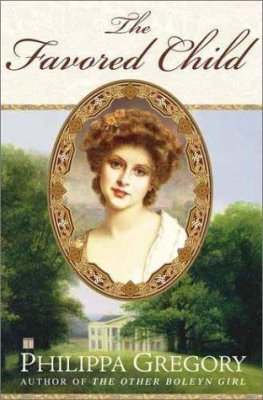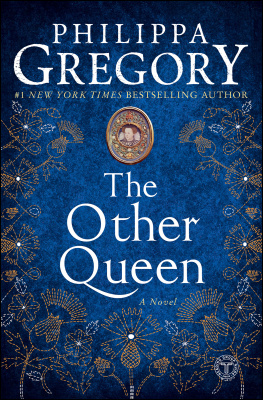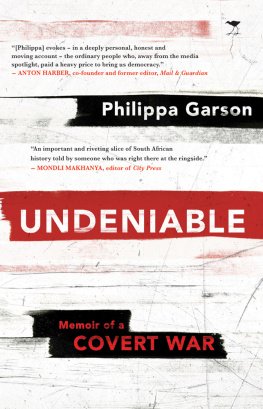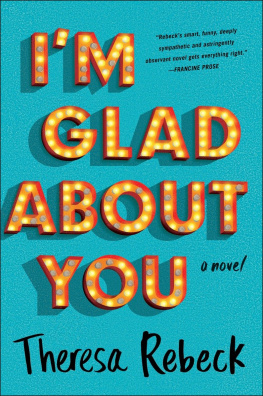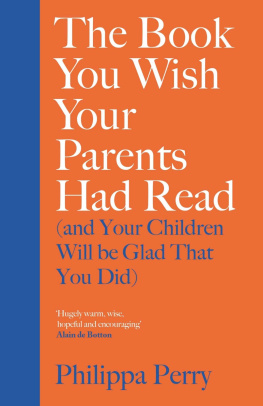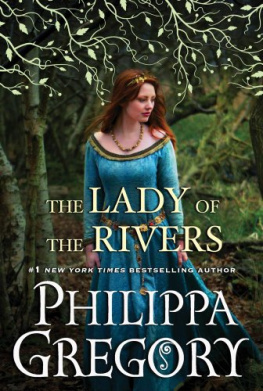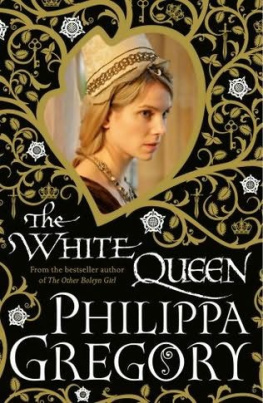Philippa Perry - The book you wish your parents had read (and your children will be glad that you did)
Here you can read online Philippa Perry - The book you wish your parents had read (and your children will be glad that you did) full text of the book (entire story) in english for free. Download pdf and epub, get meaning, cover and reviews about this ebook. year: 2019, genre: Children. Description of the work, (preface) as well as reviews are available. Best literature library LitArk.com created for fans of good reading and offers a wide selection of genres:
Romance novel
Science fiction
Adventure
Detective
Science
History
Home and family
Prose
Art
Politics
Computer
Non-fiction
Religion
Business
Children
Humor
Choose a favorite category and find really read worthwhile books. Enjoy immersion in the world of imagination, feel the emotions of the characters or learn something new for yourself, make an fascinating discovery.
- Book:The book you wish your parents had read (and your children will be glad that you did)
- Author:
- Genre:
- Year:2019
- Rating:3 / 5
- Favourites:Add to favourites
- Your mark:
- 60
- 1
- 2
- 3
- 4
- 5
The book you wish your parents had read (and your children will be glad that you did): summary, description and annotation
We offer to read an annotation, description, summary or preface (depends on what the author of the book "The book you wish your parents had read (and your children will be glad that you did)" wrote himself). If you haven't found the necessary information about the book — write in the comments, we will try to find it.
Philippa Perry: author's other books
Who wrote The book you wish your parents had read (and your children will be glad that you did)? Find out the surname, the name of the author of the book and a list of all author's works by series.
The book you wish your parents had read (and your children will be glad that you did) — read online for free the complete book (whole text) full work
Below is the text of the book, divided by pages. System saving the place of the last page read, allows you to conveniently read the book "The book you wish your parents had read (and your children will be glad that you did)" online for free, without having to search again every time where you left off. Put a bookmark, and you can go to the page where you finished reading at any time.
Font size:
Interval:
Bookmark:
Philippa Perry has been a psychotherapist for the past twenty years. A faculty member of The School of Life, she has presented several documentaries including The Truth about Children Who Lie for BBC Radio 4 and Being Bipolar for Channel 4. Most recently, Philippa has worked on a BBC Radio 4 programme, The Age of Emotion, and contributed towards the radio documentary Humiliation. She lives in London with her husband, the artist Grayson Perry, and her cat Kevin. They have one grown-up daughter, Flo.
The clich is true: children do not do what we say; they do what we do. Before we even consider the behaviour of our children, its useful essential, even to look at their first role models. And one of them is you.
This section is all about you, because you will be a major influence on your child. In it, Ill give examples of how the past can affect the present when it comes to your relationship with your child. I will talk about how a child can often trigger old feelings in us that we then mistakenly act on in our dealings with them. Ill also be looking at the importance of examining our own inner critic so we do not pass too much of its damaging effects on to the next generation.
A child needs warmth and acceptance, physical touch, your physical presence, love plus boundaries, understanding, play with people of all ages, soothing experiences and a lot of your attention and your time. Oh, so thats simple then: the book can end here. Except it cant, because things get in the way. Your life can get in the way: circumstances, childcare, money, school, work, lack of time and busyness and this is not an exhaustive list, as you know.
But what can get in the way more than any of this, however, is what was given to us when we ourselves were babies and children. If we dont look at how we were brought up and the legacy of that, it can come back to bite us. You might have found yourself saying something along the lines of: I opened my mouth and my mothers words came out. Of course, if theirs were words that made you feel wanted, loved and safe as a child, that would be fine. But so often they are the words that did the opposite.
What can get in the way are things like our own lack of confidence, our pessimism, our defences, which block our feelings, and our fear of being overwhelmed by feelings. Or when it comes specifically to relating to our children, it could be what irritates us about them, our expectations for them, or our fears for them. We are but a link in a chain stretching back through millennia and forward until who knows when.
The good news is you can learn to reshape your link, and this will improve the life of your children and their children, and you can start now. You dont have to do everything that was done to you; you can ditch the things that were unhelpful. If you are a parent or are going to be one, you can unpack and become familiar with your childhood, examine what happened to you, how you felt about it then, how you feel about it now, and, after having done that unpacking and taken a good look at it all, put back only what you need.
If, when you were growing up, you were, for the most part, respected as a unique and valuable individual, shown unconditional love, given enough positive attention and had rewarding relationships with your family members, you will have received a blueprint to create positive, functional relationships. In turn, this would have shown you that you could positively contribute to your family and to your community. If all this is true of you, then the exercise of examining your childhood is unlikely to be too painful.
If you did not have a childhood like this and thats the case for a large proportion of us looking back on it may bring emotional discomfort. I think it is necessary to become more self-aware around that discomfort so that we can become more mindful of ways to stop us passing it on. So much of what we have inherited sits just outside of our awareness. That makes it hard sometimes to know whether we are reacting in the here and now to our childs behaviour or whether our responses are more rooted in our past.
I think this story will help to illustrate what I mean. It was told to me by Tay, a loving mum and senior psychotherapist who trains other psychotherapists. Im mentioning both her roles to make it clear that even the most self-aware and well-meaning of us can slip into an emotional time warp and find ourselves reacting to our past rather than to whats happening here in the present. This story begins when Tays daughter Emily, who was nearly seven, shouted to her that she was stuck on a climbing frame, that she needed help to get off.
I told her to get down and, when she said she couldnt, I suddenly felt furious. I thought she was being ridiculous she could easily get down herself. I shouted, Get down this minute!
She eventually did. Then she tried to hold my hand, but I was still furious, and I said no, and then she howled.
Once we got home and made tea together she calmed down and I wrote off the whole thing to myself as God, kids can be a pain.
Fast-forward a week: were at the zoo and theres another climbing frame. Looking at it, I felt a flash of guilt. It obviously reminded Emily of the previous week too, because she looked up at me almost fearfully.
I asked her if she wanted to play on it. This time, instead of sitting on a bench looking at my phone, I stood by the frame and watched her. When she felt shed got stuck, she held out her arms to me for help. But this time I was more encouraging. I said, Put one foot there and the other there and grab that and youll be able to do it by yourself. And she did.
When she had got down, she said, Why didnt you help me last time?
I thought about it, and I said, When I was little, Nana treated me like a princess and carried me everywhere, told me to be careful all the time. It made me feel incapable of doing anything for myself and I ended up with no confidence. I dont want that to happen to you, which is why I didnt want to help when you asked to be lifted off the climbing frame last week. And it reminded me of being your age, when I wasnt allowed to get down by myself. I was overcome with anger and I took it out on you, and that wasnt fair.
Emily looked up at me and said, Oh, I just thought you didnt care.
Oh no, I said. I care, but at that moment I didnt know that I was angry at Nana and not at you. And Im sorry.
Like Tay, its easy to fall into making instant judgements or assumptions about our emotional reaction without considering that it may be as much to do with whats being triggered in our own background as with whats happening now.
But when you feel anger or any other difficult emotions, including resentment, frustration, envy, disgust, panic, irritation, dread, fear, et cetera in response to something your child has done or requested, its a good idea to think of it as a warning. Not a warning that your child or children are necessarily doing anything wrong but that your own buttons are being pressed.
Often the pattern works like this: when you react with anger or another overly charged emotion around your child it is because its a way you have learned to defend yourself from feeling what you felt at their age. Outside of your awareness, their behaviour is threatening to trigger your own past feelings of despair, of longing, of loneliness, jealousy or neediness. And so you unknowingly take the easier option: rather than empathizing with what your child is feeling, you short-circuit to being angry or frustrated or panicked.
Sometimes the feelings from the past that are being re-triggered go back more than one generation. My mother used to find the shrieks of children at play irritating. I noticed that I too went into a sort of alert state when my own child and her friends were making a noise, even though they were enjoying themselves appropriately. I wanted to find out more, so I asked my mother what would have happened to her if she had played noisily as a child. She told me her father my grandfather had been over fifty when she was born, he often had bad headaches and all the children had to tiptoe around the house or they got into trouble.
Font size:
Interval:
Bookmark:
Similar books «The book you wish your parents had read (and your children will be glad that you did)»
Look at similar books to The book you wish your parents had read (and your children will be glad that you did). We have selected literature similar in name and meaning in the hope of providing readers with more options to find new, interesting, not yet read works.
Discussion, reviews of the book The book you wish your parents had read (and your children will be glad that you did) and just readers' own opinions. Leave your comments, write what you think about the work, its meaning or the main characters. Specify what exactly you liked and what you didn't like, and why you think so.

